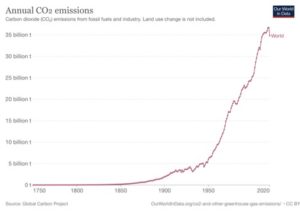The Weight of Human Sin
Dr. Moo posited that scientific studies show how humanity has affected creation in tremendous ways including, but not limited to, the decline of the number of trees on earth, the over-harvesting of the world’s fisheries, an increased extinction rate of animals, and the excessive amount of Co2. Since the 1900s, the amount of Co2 emissions produced by the burning of fossil fuels has increased exponentially, and scientists believe that a continual increase of emissions will harm the world’s ecosystems.

(Image credit: OurWorldinData)
A Gospel Challenge
I have rarely heard someone connect the gospel with humanity’s responsibility to steward creation. Dr. Moo challenged the attendees to live A.W.A.K.E. lives.
“A” is for attentiveness
To be attentive to the world around us means that it will at times help to set aside our technology and spend time in God’s word and God’s world. Setting aside our technology reminds us that we are not the center of the world.
“W” is for walking
Dr. Moo seems to have meant “walking” metaphorically and literally. In such a fast-paced society, we should slow down to attend to the world around us. One way to do this is to walk rather than drive when possible. This will allow us to be more attentive to the world around us.
“A” is for activism
One of the most important points. Talk about these things with family, friends, and church, even when it is uncomfortable.
- “What if our churches became instantiations of the new creation, and pointed the world to God’s purpose of reconciliation of all people and all the earth to God in Christ?” -Dr. Moo
Activism, Dr. Moo suggested, is not always best done protesting in front of courthouses, but sometimes it is best done in a personal context.
- “Our Christian convictions transcend and challenge every political party, every political ideology.” – Dr. Moo
“K” is for Konsumerism
Deliberately spelling “consumerism” with a “K” for the sake of the acronym, Dr. Moo hopes that we would not just think about our consumerism, but that we would often just stop consuming. Our culture is so consumer-focused. Why not invest in those who are caring better for the earth rather than consuming as much as possible?
“E” is for Eating
One way to invest in those who are caring well for the earth is to buy food from farmers who are working hard to care better for the land. This may at times mean buying food that costs more and aiming to support those who work out of a desire to steward natural resources well.
Conclusion
Regardless of political convictions, Scripture should inform the way that humans relate to creation. Christians should not only be consumers of the world around them. They must care for what has been given to them. I am thankful to Dr. Moo for raising questions that I have not often thought to consider about the way that I relate to creation.
We are also appreciative of the American Association for the Advancement of Science which provided the grant that made this lecture possible.
Additional Resources:





No comments have been added.